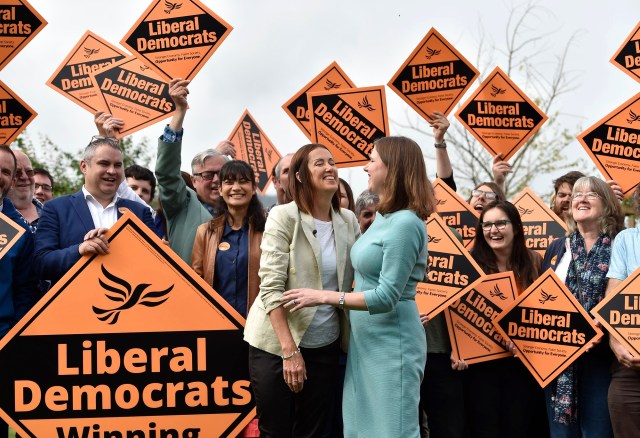The Lib Dems swooped to victory. Credit: Matthew Horwood/Getty Images

By-elections always offer political commentators new reasons to believe what they believed before. The Brecon and Radnorshire by-election is no exception: if you’re looking to satisfy your confirmation bias, then you can fill your boots.
The Liberal Democrats took the seat from the Conservatives after sitting MP Chris Davies was convicted of expenses fraud. They overturned a majority of about 8,000, with new MP Jane Dodds securing about 1,400 more votes than Davies, who decided to stand again. Labour did badly, barely holding their deposit. The Brexit Party took 10% of the vote.
These are the facts.
They are, variously, proof of the following:
- 1. The Brexit Party is successfully putting pressure on Boris Johnson, denying him wiggle room and helping guarantee we leave on October 31.
- 2. The Brexit Party is making it harder for Boris Johnson to get us out of the EU, by replacing a Brexiteer MP with an ardent Remainer.
- 3. The Conservative vote held up well considering the MP had been convicted of expenses fraud.
- 4. The Conservatives only squeezed the Brexit Party down to 10% because the sitting MP was so popular locally.
- 5. The Liberal Democrats are the strongest Remain party and as head of a Remain alliance can become the new main party of opposition.
- 6. Remain parties got substantially fewer votes than Leave parties, so being the “party of Remain” is never going to work for the Lib Dems.
- 7. Labour’s collapsing in Wales.
- 8. Labour needs to adopt a clear policy to remain.
- 9. Labour needs to adopt a clear policy to leave.
- 10. Labour needs to ditch Jeremy Corbyn.
The only topic on which there appears to be consensus is that Brecon and Radnorshire is a particularly beautiful part of the country, even if some of its towns and villages remain entirely unpronounceable to the travelling activists who turned up over the last months. The best moment of the night was when the High Sheriff of Powys decided to read out the results exclusively in Welsh, leaving the scores of English speakers in a state of pale-faced panic about who had really won.
But among all this arguing, there’s a lot of clarity. Liberal Democrats are joyful and optimistic. They know what to do next: double down as the party of Remain, stake their claim as the leader of the Remain alliance, and try to get other parties and other MPs to join them. Full steam ahead.
The Conservatives have plenty to console themselves with. I don’t think their strategy was up for debate, but even if it were, the result gives them a clear rationale for pursuing it. Squeeze the Brexit vote, put the Leave coalition back together, and let the Remainers and the moderates go. Full steam ahead.
The only party that deserves to be confused this morning is Labour. Labour used to own Wales: they have topped the poll in seats and votes in every general election in my lifetime, and beyond it. Perhaps Brecon and Radnorshire isn’t a particular stronghold for the party, but to clock in only 5.3% of the vote is truly abysmal.
Brexit is the defining issue of the decade, and it is a binary one. In or out. Leave or Remain. The two camps are getting more and more entrenched in their positions, and Labour’s attempt to straddle both is killing them. They have managed to contort themselves in a way that makes almost everyone who cares about Brexit angry, hoping perhaps that Brexit would no longer be a big deal by the time of the General Election.
But Brecon and Radnorshire makes it harder than ever to avoid a General Election this autumn, before Brexit has happened. In a Brexit election, I struggle to see how Labour avoids tearing itself apart. Too Leave-ish for the Remainers, and too Remain-ish for the Leavers. In politics, you have to take a side. Labour needs to make its choice, before it is too late.










Join the discussion
Join like minded readers that support our journalism by becoming a paid subscriber
To join the discussion in the comments, become a paid subscriber.
Join like minded readers that support our journalism, read unlimited articles and enjoy other subscriber-only benefits.
Subscribe